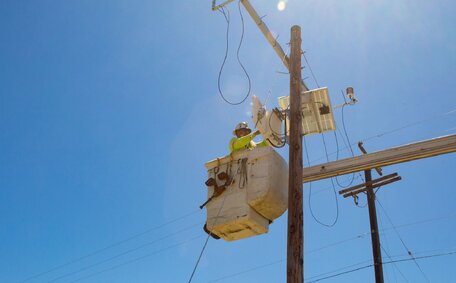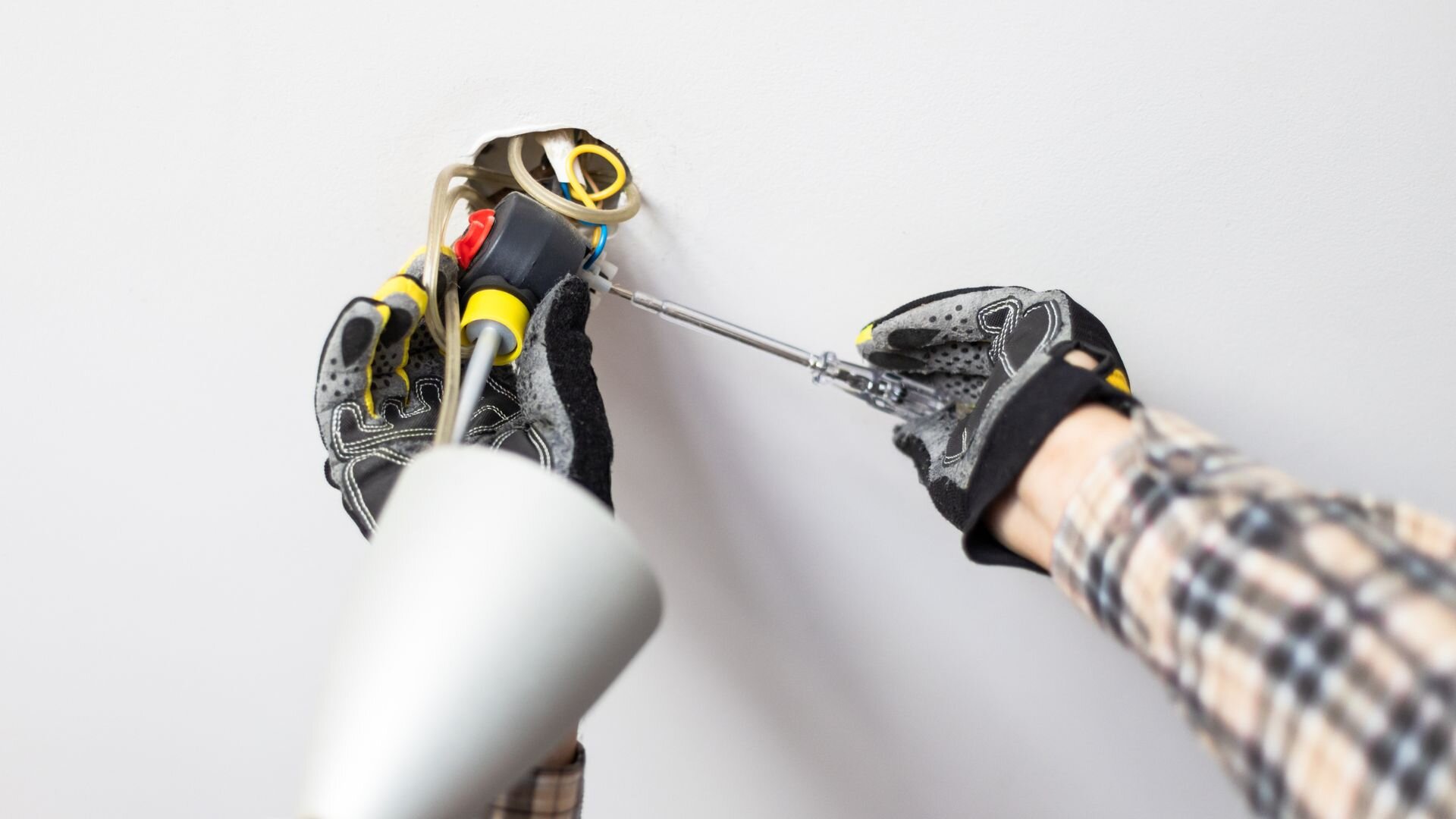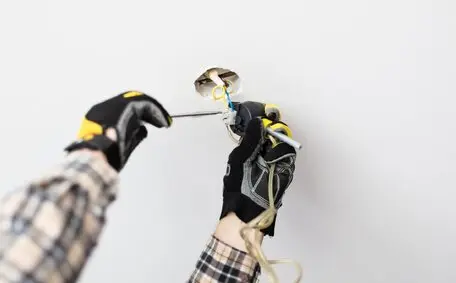Flickering lights, tripping circuit breakers – everyday annoyances that could signal a much bigger problem. Electrical safety is paramount in our homes and workplaces. It’s about ensuring electrical installations and equipment comply with Australian standards set out in the Electricity Act 1996 ( Vic) and the AS/NZS 3000 Wiring Rules.
Electrical non-compliance poses serious hazards. Faulty wiring can lead to electrical fires, a leading cause of property damage in Australia. More importantly, it can cause electric shock with potentially life-threatening consequences.
Taking steps to address electrical non-compliance isn’t just about sidestepping danger. Imagine the peace of mind knowing your system is running safely and smoothly. Plus, having everything up to code can boost your property’s value!
It’s very important to get a registered electrical contractor to fix any problems. They’ll have a look at your systems, spot any compliance issues, and do the necessary repairs. Once done, they’ll give you a Certificate of Electrical Safety (COE), proving your system meets the requirements.
This ensures a safe and energy-efficient electricity supply for your home. For more information on electrical safety compliance or to lodge a complaint about suspected non-compliance, you can contact Energy Safe Victoria, the government body overseeing electrical safety in the state.
Common Electrical Non-Compliance Issues in Australia
Ensuring our homes are safe and comfortable places to live is essential. However, electrical non-compliance can pose significant risks. Here are some of the most common electrical compliance issues faced by homeowners, along with how they can be addressed:
![2024 05 Burining Switch Outlet Burining Switch Outlet]()
Outdated Wiring
Many homes built before the 1960s may still be equipped with Vulcanised Indian Rubber (VIR) cabling, which deteriorates over time. This can lead to brittleness, cracking, and an increased risk of electrical fires and shocks. Signs of outdated wiring include brittle insulation, a lack of earthing wires, and flickering lights. It’s crucial to have a licensed electrical worker conduct a thorough inspection and undertake any necessary rewiring. This ensures compliance with current electrical standards and enhances the safety of your home.
Overloaded Circuits
With the multitude of electrical devices in modern homes, circuits can easily become overloaded. This overloading can cause circuits to overheat and potentially lead to fire hazards. Indicators of this issue include frequently tripping circuit breakers, dimming lights, and a burning plastic smell. To mitigate this risk, ensure that all electrical work carried out in your home is done by a licensed electrical professional and that high-wattage appliances have their dedicated power points.
Faulty or Damaged Electrical Equipment
Utilising faulty or damaged electrical equipment can lead to severe safety hazards, including electrical fires and electrocution. It’s important to conduct a visual inspection regularly for frayed wires, cracked plugs, and signs of overheating. Replace any compromised equipment promptly to maintain electrical safety.
Missing Safety Devices
Residual current devices (RCDs) are crucial for detecting imbalances in the electrical current, quickly tripping the circuit to prevent electric shocks. Under the Electricity General Regulations 2012, these safety devices are mandatory in areas such as bathrooms and laundry. Hiring a licensed electrician to ensure your home is equipped with RCDs is a step towards fulfilling safety requirements and enhancing overall electrical safety.
Improper Earthing
A proper earthing system is essential for the safety of any electrical installation, providing a path for stray currents to disperse harmlessly. If you experience a tingling sensation when touching electrical appliances, it’s a potential sign of earthing issues. It’s necessary to engage a licensed electrical professional who can assess and rectify these problems, ensuring compliance with safety technical standards.
Compliance and Record Keeping
Obtaining a Certificate of Electrical Compliance is vital when any electrical work is carried out. This document serves as proof that the work complies with the NSW Fair Trading regulations and should be kept for your own records. Additionally, it is crucial to ensure that all electrical products used meet the Australian safety electrical standards to avoid penalties and ensure safety.
It’s wise to make sure any electrical worker in your home is properly licensed and follows the Electricity Consumer Safety regulations. Getting your system checked now and then by an authorised officer from the electricity network helps maintain compliance and safety.
Taking Action: What to Do If You Suspect Non-Compliance
![2024 05 Undertaking Defect Notice Inspection Undertaking Defect Notice Inspection]()
Electrical safety is definitely not for DIY enthusiasts. If you think something’s amiss, resist fixing it yourself. Leave it to the pros! Only licensed electricians, well-versed in safety standards outlined in the Electricity Act 1996 (Vic) and AS/NZS 3000 Wiring Rules, should handle these installations.
Contact a licensed electrician for a thorough electrical safety inspection for peace of mind. This inspection will visually examine your electrical system, including wiring, switchboards, power points, and safety devices like RCDs. The electrician may also use specialised testing equipment to assess circuit integrity and identify any potential problems.
After the inspection, you’ll get a detailed electrical safety report. It’ll lay out any issues and suggest fixes to get your system up to standard. Keeping this report handy is smart for future reference and can even bump up your property’s value when you decide to sell.
Remember, neglecting electrical hazards can have serious consequences. Taking proactive steps to ensure electrical safety in your home is an investment in your well-being and that of your family.
Living Safe with Compliant Electricals
Ensuring that your home’s electrical system adheres to the AS/NZS 3000 Wiring Rules is crucial for maintaining a safe environment. This compliance not only secures the well-being of your family but also protects your property from potential hazards such as electrical fires and shocks.
Regular check-ups with a licensed electrician are key. They’ll look over everything—safety switches, power lines—to make sure everything’s on point. Every job must align with the Electricity Safety Act 1998 and the Act 1996 Electricity General Regulations. This thoroughness helps ensure everyone’s safety and peace of mind.
After the inspection, if your system meets all required standards, you will receive a Certificate of Electrical Safety (COE). These certificates confirm that the electrical work adhered to current regulations and standards. Holding such certificates of compliance can prove advantageous, particularly when you need to demonstrate the safety and compliance of your home, whether for selling the property or for insurance purposes.
![2024 05 Fixing Outdared Wiring Fixing Outdared Wiring]()
In addition, maintaining an electrical system that complies with these standards can increase electrical efficiency, which may reduce energy bills. It is also crucial that electricians provide documentation that certifies the compliance of the work completed. This ensures that any future inspections or repairs can be carried out with a clear understanding of the system’s history and compliance status.
Electricity work must also include installing and testing safety devices such as safety switches, which play a critical role in preventing accidents. The compliance certificate you receive serves as a reassurance that these devices are correctly installed and functioning.
Prioritising the compliance of your home’s electrical system is a wise investment in your safety and the integrity of your property. Make sure to engage only licensed professionals who will provide you with the necessary certificates of compliance. This proactive approach safeguards your home and ensures peace of mind, knowing that your electrical system meets all required safety standards.
Power Up Your Safety: Ensure Electrical Compliance for Your Home
At Bright Force Electrical, we’re passionate about keeping your home safe. We’re a trusted provider of electrical safety inspections and rectification services across Australia.
If you’ve recently received a Defect Notice highlighting electrical non-compliance in your home, don’t wait. Our experienced and licensed electricians can ensure your electrical system meets all relevant safety standards as outlined in the AS/NZS 3000 Wiring Rules.
Contact Bright Force Electrical today for a no-obligation quote on our Defect Notice rectification services. We’ll bring your home’s electrical system up to code, giving you peace of mind and a safer environment for your family.











